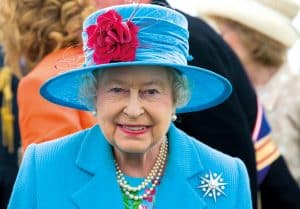The Queen is Dead, Long Live the King: History and Heredity Endure in Britain

Queen Elizabeth II
When Queen Victoria was invited to officially open the new town hall in Manchester in 1868, she agreed — on condition that the city’s civic leaders remove a statue of Oliver Cromwell.
The traditionally radical city refused, and the Queen declined the invitation. The shadow cast by the country’s 10-year civil war between Royalists and Republicans in the middle of the 17th Century was still there. In a similar incident, just before the outbreak of World War I, Winston Churchill, then First Lord of the Admiralty, suggested naming a new battleship after Cromwell. King George V quickly vetoed the idea of using the name of someone guilty of regicide.
A much older Sir Winston was prime minister when Elizabeth II came to the throne. The nation — so recently ravaged by World War II — willingly grasped at the notion of a new Elizabethan Age, and a country set for global expansion.
Over the following 70 years, Elizabeth II steered a steady and adroit path towards a more modern monarchy, against a backdrop of rapid social change. She had to deal with the dismantling of the British Empire, and the decline of what had been one of the world’s great powers.
She also had to adapt to changing attitudes. After the war, the British began to discard the outdated “certainties”. Some — then as now — questioned the notion of monarchy, and saw it as an anachronism in a world on the brink of social and technological revolution.
That Queen Elizabeth II succeeded in ensuring the survival of the institution, and cementing the monarchy into the life of the nation, was never more vividly illustrated than by the reaction to her death in September.
“Despite her age and frailty, the possibility of her death seemed not to have occurred to many of her subjects.”
Despite her age and frailty, the possibility of her death seemed not to have occurred to many of her subjects. When the news broke on September 8, there was a sense of national catastrophe, as if the main supporting beam of the kingdom’s structure had been knocked out.
Perhaps that is unsurprising. The effects of the recent pandemic, the war in Ukraine, the sudden increase in the cost of living and the looming energy crisis all conspired to instil fear into the nation’s heart. These are uncertain times. And now the Queen — the one constant — was suddenly gone.
Over a remarkable couple of weeks, her death appeared to unite the country. Her life of dedicated service, her quiet diplomacy, and above all, her deft determination to remain above the politics of the day turned national grief into something more optimistic.
It became a celebration of a woman who will be remembered as great monarch.
On the day of the funeral, the German newspaper Der Spiegel ran an opinion piece which questioned why the Queen had never made a stand against Brexit. It argued that had she stood up for EU unity, the unpleasant event could have been avoided.
The article missed the point. The Queen — thanks largely to Oliver Cromwell — understood that she was a figurehead, not a politician. She took her private thoughts on Brexit to her grave, as required of a constitutional monarch.
Equally, she remained above the bawdy day-to-day Britishness of her subjects. We will never know what she thought, for instance, of her mocking portrayal by the television puppet show Spitting Image. Did she ever read the satirical magazine, Private Eye, which referred to her as “Brenda” right up to her death?
The Queen and the Royal Family were frequently the subject of fiction. Most recently, the Netflix series The Crown turned her life into a soap opera watched by billions. Throughout her reign she worked hard to stay in touch with changing social trends, even inviting the television cameras into her private life in the 1960s. That was a break with long-held royal tradition; it portrayed the Windsors as an ordinary family — and its impact was immense.
At only one point in her life did she seem to miss the beat of the public mood: the death of Princess Diana. The British playwright, Peter Morgan, the creator of The Crown, was also the screenwriter for the Oscar-winning 2006 film, The Queen. The latter work described the turmoil in the House of Windsor after the death of Diana in August 1997.
While the film is a fictionalised account, it accurately depicted a fundamental change in tone. The public reaction took the establishment by surprise. At the time, the breakdown of the princess’s marriage to Prince Charles, the heir to the throne, and their subsequent divorce, had been making sensational headlines across the world. Many thought the response to her death bordered on the hysterical, something until then alien to British society. People began to ask why the flag was not being flown at half-mast at Buckingham Palace — and no explanations of royal protocol could calm the increasingly angry crowds.
The Queen and her family remained in Balmoral in Scotland, adding to the public feeling of royal insensibility. In the film, she is depicted as confused and uncertain, someone “not best equipped” to cope with the flood of public emotion. Helen Mirren, who portrayed the Queen, won a Best Actress Oscar for her performance. It was reported that Her Majesty approved.
In the two weeks leading up to the Queen’s funeral, most commentators focused on her dedication and service to the country over 70 years. There was a tendency to gloss over the less agreeable moments of family turmoil: the public humiliation of Prince Andrew, the overseas activities of Prince Harry and Meghan Markle.
Perhaps history will focus on the Queen’s achievements. Such as the brief moment when she shook the hand of former Irish Republican Army commander Martin McGuinness. In doing so, she advanced the cause of peace in Northern Ireland.
One wonders whether Queen Victoria, given her attitude to Cromwell’s statue in Manchester, would have done the same. Cromwell ran the country as a republic for a few years. By 1660, the British people, beaten down by war and the heavy hand of Puritanism, were ready to invite Charles II back to the throne.
But there would be no more insistence of the divine right of kings — but the UK is once again a literal kingdom. Charles II, back in the 1600s, was known as “The Merry Monarch”. He launched a tradition of royal scandal with his open dalliances, and once said: “I always admired virtue, but could never imitate it.”
His carefree approach to kingship can be forgiven; his reign followed a dark period in British history. His namesake, King Charles III — given his mother’s example — is likely to steer more towards virtue than frivolity.
By Tony Lennox
You may have an interest in also reading…
Inflation, Used Cars, Silicon Chips and Supply-Demand: Links in a Worrying Chain
Chips — no, not the potato or chocolate kind, the electronic ones – are a driving force behind a spike
Money, Munitions, Military Outlay, and EU’s Plight in War of ‘Catch-up’
There is no more enduring truth than that expressed by Roman statesman and philosopher Marcus Tullius Cicero: ‘The sinews of
Click OK and Call Me in the Morning — How Online has Changed Shopping for Meds
Social media have been on about the New Normal since the start of the pandemic. People are still looking forward


















































































